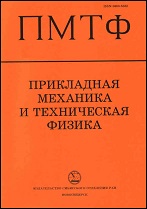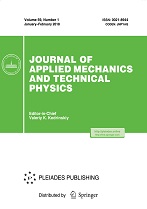|
This article is cited in 3 scientific papers (total in 3 papers)
Linear stability of the Couette flow of a vibrationally excited gas. 2. Viscous problem
Yu. N. Grigor'evab, I. V. Ershova
a Institute of Computational Technologies, Siberian Branch of the Russian Academy of Sciences, Novosibirsk, 630090, Russia
b Novosibirsk State University, Novosibirsk, 630090, Russia
Abstract:
Based on the linear theory, stability of viscous disturbances in a supersonic plane Couette flow of a vibrationally excited gas described by a system of linearized equations of two-temperature gas dynamics including shear and bulk viscosity is studied. It is demonstrated that two sets are identified in the spectrum of the problem of stability of plane waves, similar to the case of a perfect gas. One set consists of viscous acoustic modes, which asymptotically converge to even and odd inviscid acoustic modes at high Reynolds numbers. The eigenvalues from the other set have no asymptotic relationship with the inviscid problem and are characterized by large damping decrements. Two most unstable viscous acoustic modes (I and II) are identified; the limits of these modes were considered previously in the inviscid approximation. It is shown that there are domains in the space of parameters for both modes, where the presence of viscosity induces appreciable destabilization of the flow. Moreover, the growth rates of disturbances are appreciably greater than the corresponding values for the inviscid flow, while thermal excitation in the entire considered range of parameters increases the stability of the viscous flow. For a vibrationally excited gas, the critical Reynolds number as a function of the thermal nonequilibrium degree is found to be greater by 12% than for a perfect gas.
Keywords:
linear stability theory, vibrational relaxation, two-temperature aerodynamics, disturbance modes.
Received: 17.11.2014
Citation:
Yu. N. Grigor'ev, I. V. Ershov, “Linear stability of the Couette flow of a vibrationally excited gas. 2. Viscous problem”, Prikl. Mekh. Tekh. Fiz., 57:2 (2016), 64–75; J. Appl. Mech. Tech. Phys., 57:2 (2016), 247–257
Linking options:
https://www.mathnet.ru/eng/pmtf856 https://www.mathnet.ru/eng/pmtf/v57/i2/p64
|


| Statistics & downloads: |
| Abstract page: | 38 | | Full-text PDF : | 10 |
|





 Contact us:
Contact us: Terms of Use
Terms of Use
 Registration to the website
Registration to the website Logotypes
Logotypes








 Citation in format
Citation in format 
